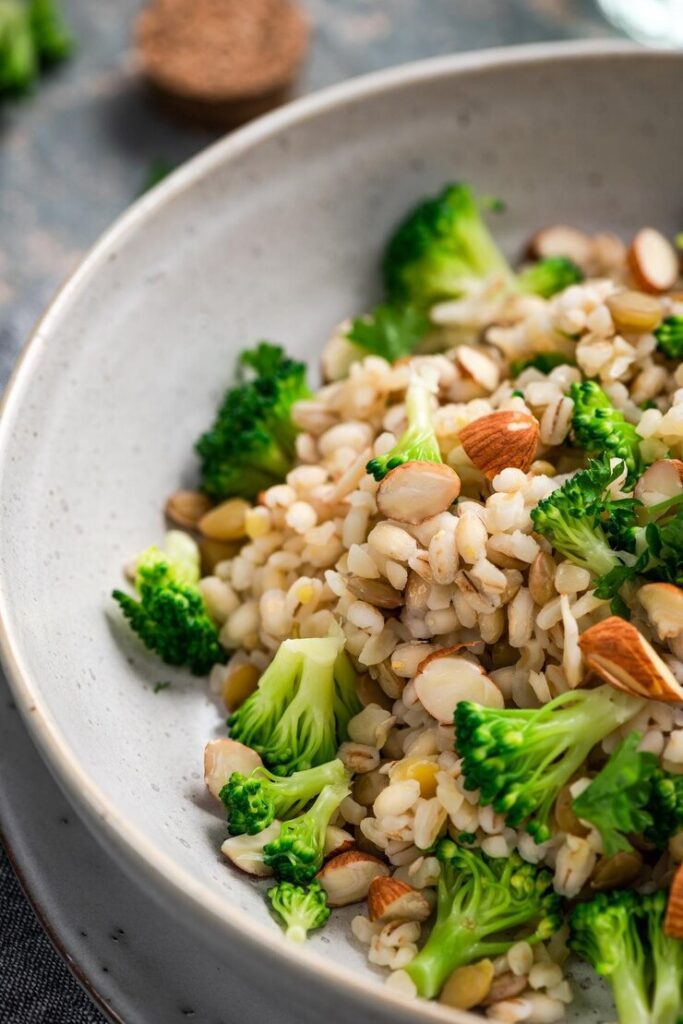Hormonal health affects everything—from mood and energy to weight, sleep, and libido. Imbalances in hormones such as estrogen, progesterone, cortisol, insulin, and testosterone can lead to a variety of physical and emotional issues. The good news? What you eat can significantly influence how your hormones behave. This guide breaks down the best foods to help balance your hormones naturally.
1. Estrogen Dominance
Symptoms: Mood swings, weight gain, fibroids

What to Eat:
- Broccoli: Rich in DIM (diindolylmethane), which helps the body metabolize excess estrogen
- Flaxseeds: Contain lignans that balance estrogen levels
- Whole grains: Aid in gut health, supporting estrogen detoxification
Estrogen dominance is common in women and can lead to PMS, breast tenderness, and even fertility challenges. Cruciferous vegetables like broccoli are powerful estrogen regulators that also support liver function.
2. Low Progesterone
Symptoms: Irregular menstrual cycles, anxiety
What to Eat:
- Bananas: Provide B6, essential for progesterone production
- Leafy greens: Rich in magnesium, which supports hormone synthesis
- Healthy fats (avocados, nuts, seeds): Help the body produce hormones naturally
Progesterone helps stabilize mood and supports a healthy menstrual cycle. When levels dip, stress and anxiety often rise. Supporting adrenal health with magnesium-rich greens and healthy fats can naturally encourage hormone balance.
3. Thyroid Imbalance
Symptoms: Fatigue, sluggish metabolism, mood swings
What to Eat:
- Seaweed: A natural source of iodine, vital for thyroid hormone production
- Nuts: Contain selenium, essential for thyroid conversion
- Lean protein (eggs, fish): Provides tyrosine, a building block for thyroid hormones
The thyroid regulates metabolism and energy. If it’s underactive (hypothyroidism), you may feel constantly tired or cold. These thyroid-supportive foods promote a healthier metabolism and mental clarity.
4. Cortisol Issues
Symptoms: Chronic stress, poor sleep, burnout
What to Eat:
- Citrus fruits: High in vitamin C, which helps reduce cortisol
- Spinach: A magnesium-rich green that helps regulate the nervous system
- Complex carbs (sweet potatoes, oats): Stabilize blood sugar and prevent cortisol spikes
Cortisol is your primary stress hormone. A poor diet, lack of sleep, or emotional stress can cause this hormone to spike uncontrollably. Eating vitamin C-rich fruits and leafy greens can help bring cortisol levels back to balance.

5. Insulin Resistance
Symptoms: Weight gain, sugar cravings, fatigue
What to Eat:
- Berries: Low-glycemic and rich in antioxidants
- Legumes: Full of fiber and protein, which stabilize blood sugar
- Healthy fats (nuts, olive oil): Help reduce insulin spikes
- Whole grains: Provide steady energy without sugar crashes
Insulin resistance can lead to prediabetes or type 2 diabetes if not managed. Pairing carbohydrates with fiber and fats slows glucose absorption, keeping your blood sugar and insulin levels stable.
6. Low Testosterone
Symptoms: Low energy, mood dips, decreased libido
What to Eat:
- Oysters: Extremely high in zinc, essential for testosterone production
- Eggs: Provide cholesterol, the base compound for making hormones
- Healthy fats: Needed to synthesize hormones and support sexual health
While testosterone is often associated with men, it’s also essential for women’s energy, muscle tone, and libido. Zinc and cholesterol-rich foods support healthy levels of this hormone.
Final Thoughts:
Hormones are delicate messengers that influence nearly every process in your body. Balancing them isn’t about drastic changes—it’s about making the right food choices daily. Whether you’re managing stress, restoring energy, or supporting menstrual and reproductive health, food is your first medicine.
Choose a hormone-friendly plate today. Your body—and mind—will thank you.


